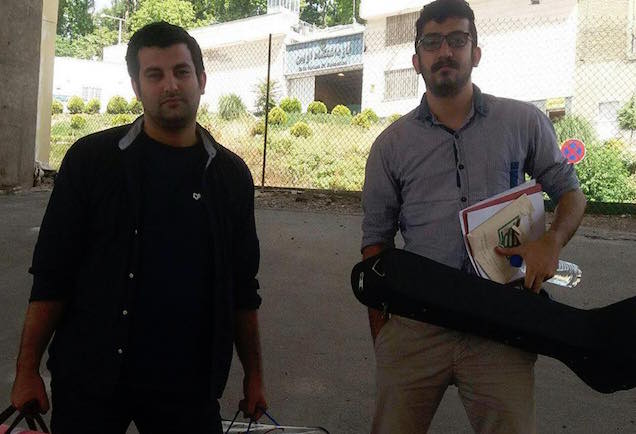News

Two Iranian brothers – a musician and a filmmaker – began serving their three-year prison sentence at Tehran’s Evin Prison on Sunday, June 5.
Mehdi Rajabian, a musician and founder of BargMusic, and his brother Hossein Rajabian, an independent filmmaker, were arrested by Iran’s Revolutionary Guards in October 2013, along with a third artist, Yousef Emadi, the manager of BargMusic.
After spending two months in solitary confinement, the three artists were released on a bail of $67,000 each. During their time in detention, they were allegedly pressured to confess.
“They were encouraged by their interrogator to sign confessions against themselves,” a source who wished to remain anonymous told IranWire in December 2015. “They were told that the charges against them were not political but related to their illegal activities in music and filmmaking and that if they confessed their cases would close.”
The BargMusic website distributes alternative music across Iran and promotes the work of Iranian artists and lyricists, including female soloists.
The notorious Judge Mohammad Moghiseh of Branch 28 of the Revolutionary Court initially sentenced each of the three artists to six years in prison on charges of “insulting the sacred” and “propaganda against the regime” in connection with the production and promotion of underground music.
In February 2016, the appeals court’s Judge Hassan Babaee reduced the prison sentence to three years, and a three-year suspended sentence. Both judges, Babaee and Moghiseh, have repeatedly been accused of violating the human rights of defendants and abusing fair trial principles.
The three artists were also ordered to pay a fine of 200 million rials ($6,600) each. In a post on his Instagram page on March 10, Mehdi Rajabian said he was left with no other choice than to put his musical instrument, the setar, up for sale to pay the fine imposed by Iran’s Revolutionary Court.
“My instrument is all I have,” he wrote. So I put this instrument, which has made me cry and laugh, on sale. It isn’t just an instrument, but the broken sword of a defeated soldier.”
The third artist, Yousef Emadi, was reportedly summoned to Evin Prison on the same day as the Rajabian brothers, but no further information has been made available about his case.
In Iran, musicians face harsh regulations from the government. They must obtain an official license to produce music or to hold a concert, a requirement that gives authorities the power to closely control the music scene and ensure it lives up to so-called Islamic norms and standards. Without such a license, they face the risk of arrest and imprisonment.
Emadi and the Rajabian brothers are among dozens of Iranian journalists, writers and artists who have been arrested or sentenced to prison in the last few months. In February 2016, an appeals court sentenced filmmaker Keywan Karimi to one year in prison for making a documentary about political graffiti in Tehran. His sentence came just a few weeks after two members of the heavy metal band Confess were released on bail awaiting trial after being held in solitary confinement for months.
Related articles:
Alternative Musicians Sentenced to Jail